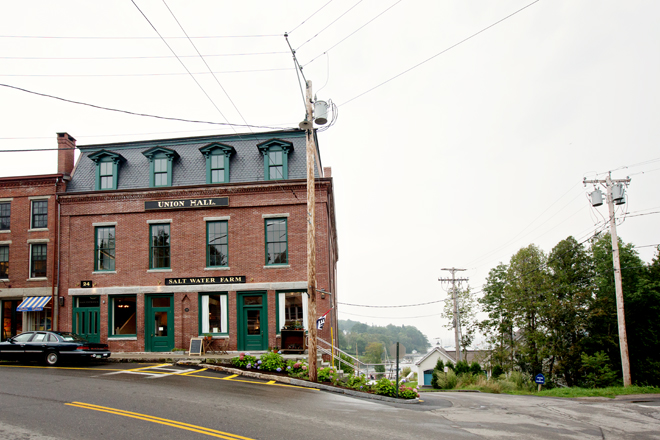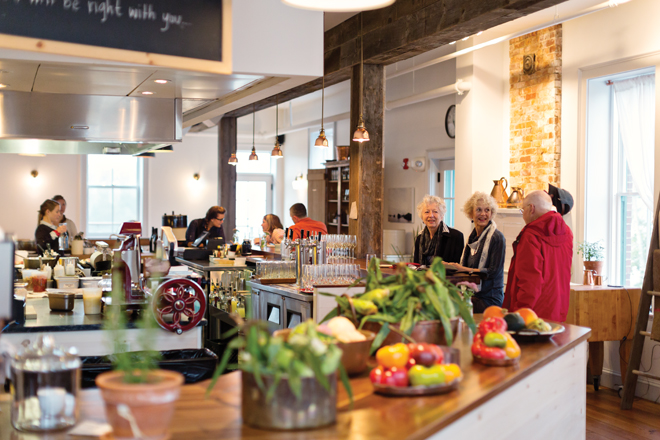Salt Water Farm At Union Hall
When Annemarie Ahearn talks about her collection of copper pots, she leans forward conspiratorially, elbows on the table, and her cool blue eyes light up. She describes the long history of these gleaming vessels in the same tones in which other women her age might discuss a particularly juicy piece of gossip, or a promising lead on a new apartment. “You have to put this in the article,” she says. The copper pans, pots, and bowls that are scattered around the space (and find their natural home in the open kitchen at the Salt Water Farm) come from a food historian named Sandy Oliver, who allowed Annemarie to borrow the wares from her collection. “This is the stuff kings and queens used to use,” Annemarie tells me with complete seriousness. “Everything in this space—it all has such history.”
After moving to Maine from New York in 2010, Annemarie swiftly built a reputation for herself at Salt Water Farm, a much-lauded cooking school located on a gorgeous seaside property in Lincolnville. Her classes, and the monthly supper club, were so popular that in April of 2013, Annemarie decided to open a restaurant in nearby Rockport. After scouting over 40 different spaces, she settled on the historic Union Hall for the Salt Water Farm Cafe and Market, which offers charming views of the harbor and its many tilted masts.
Throughout my visit, I’m continually impressed by how well Annemarie has blended the old and the new. Inside, the wood tables are rustic and raw; the decor is simple, entirely without pretense. The menu is filled with hearty, old-fashioned food, much of which was inspired by traditional New England cooking techniques. And while much of Annemarie’s staff hails from Brooklyn, Chicago, and other urban centers, the young, talented chefs, servers, and bartenders seem to have taken to their new northern home like seagulls to the misty sky. They may be new to Maine, but I don’t know if I would call any of the people I met “from away.” Their roots are growing here, and I often think that’s all it takes.
Perhaps I’m just being prickly, because I am also a recent transplant to the Maine soil. When I hear Annemarie describe why she decided to make this state her home, I feel goosebumps, and I swear they have nothing to do with the fact that we’re on our third cocktail, a fizzy and light confection made with beet juice and egg whites that looks like dessert but tastes like the earth. “I felt like something was missing in New York, no matter how successful I was,” Annemarie confides. But here, “every day I climb a mountain by myself and look out over Maine and the ocean. That’s more fulfilling than anything I could do in New York in a day.” Aside from the mountains and the sea, the thing that drew Annemarie to Maine is something more ephemeral, yet paradoxically, more primal. People here, she explains, know how to take care of themselves. It is soulful and slow, this way of life. And that’s why she likes it.
This almost luxurious attention to detail, coupled with a tenacious belief in the power of good, simple things, appears time and again on the menu at the Salt Water Farm Cafe. I first visited the restaurant on an early fall afternoon, when the weather had just begun to turn. I found Annemarie sitting at a table at the back of the restaurant, talking to the bartender about the night’s cocktail creations. Watching her at work, it is easy to see why this young woman has made such a name for herself: she is serious, calm, and completely in control when it comes to matters of the mouth.
“The kind of food that we cook here is the kind of food that you would cook at home if you knew how to,” she tells me between slurps of wild American oysters, dressed simply with a squeeze of lemon juice and served on a snarl of reddish-brown seaweed. “This is what you would make for lunch if you had access to the freshest ingredients, and knew exactly how to handle them.” Coming from another chef, this might sound condescending, yet Annemarie presents it as a simple fact, and I find myself believing her. It doesn’t hurt that Annemarie founded the Salt Water Farm in 2010, an ingenious cooking school where students gather ingredients, assemble them under Annemarie’s tutelage, and sit down to a family-style dinner in a beautiful house owned by Annemarie’s gracious parents, all in the course of one evening. It is farm-to-table in its most unadulterated form, and her audience loves it. For years, Annemarie has been teaching people how to cook, and now with this newest endeavor, she’s offering the same quality meal without the hours of work.
Like the students at her cooking school, I was invited to share a meal with Annemarie, which gave me a far greater appreciation of both the food and the clear-eyed chef than I could have ever gained eating this fare alone. Over the course of several hours, we nibbled our way through every offering on the menu. Although the menu changes daily and features everything from sautéed greens to rich, pink slices of duck, there was an quiet, steady undercurrent that hummed through each bite, from the smashed beets to the seared scallops. It tasted like waves and forest, ragged coasts and overgrown fields. In a strange and moving way, this food tasted like eating bites of Maine, like love and place and the modest wisdom of time.
The braised leeks and wild mushrooms, served with an egg and some fluffy ricotta over a thick slice of country toast, taste like waking up on a cold winter morning to the smell of coffee and the warm smoke of charred bread. This dish, which looks about as humble as a dish can look, may have be my favorite item on the menu. As we break the yoke on the farm-fresh egg and watch it slowly saturate the white bread below, I think about every morning I had done the same thing in my own home. But I didn’t have a pile of sautéed wild mushrooms, foraged from the Maine woods, sitting atop my toast. Nor did I have leeks, cooked to tender, sweet perfection with just a hint of carmelization, or milky cheese purchased from a young couple that lives in nearby Camden. This vaguely messy plate is everything I would like to make to for myself, but never quite have the time (and, to be honest, I also lack the dedication to treat myself with this much meticulous care).
As the evening wanes, we move from delicate salads and rustic toast to shredded piles of peekytoe crab and generous slices of duck breast. While Annemarie seems to enjoy the crab the most, which works wonderfully with bites of ruffly kale and thinly sliced smoked salmon, I can’t stop eating the Milkhouse Duck. To be more accurate, I should say I can’t stop eating the spaghetti squash that is under the duck. Dressed with brown butter and sage and soaked with the savory juices of the bird, this is unlike any squash I have ever tasted. When paired with bites of the succulent meat, it creates the perfect forkful.
Over dessert, Annemarie answers a few questions I was too shy to ask at the beginning of the meal, such as: how in the world have you made this happen? Staring at someone close to my own age, I couldn’t help but suspect witchery or other means of black magic. Of course, it’s a lot simpler than that. “This is a family affair,” she reveals. Her parents not only visit the restaurant daily, checking up on affairs and sneaking treats from the kitchen, they also work alongside Annemarie on the family’s oceanside farm. “My dad’s the beekeeper and he got stung to shit the other day,” she laughs. “My parents are in the background of everything. I have the most generous parents in the world.” Without their help, Salt Water Farm would never have become a production farm, as it did earlier this year. While not every piece of produce comes from their sunny family garden, much of the food (including the fresh eggs) is the product of their tireless work.
Of course, no restaurant could run this smoothly without an excellent staff, and Annemarie has organized a very talented roster—although she did have one strange requirement for anyone moving to Maine to work at the Cafe and Market: they needed to come in winter. “I wanted them to experience a Maine winter before they committed,” just in case it might scare them off, I suppose. Fortunately, not even the angry gales or the knee-deep snow deterred the project. “It’s remarkable how quickly a staff becomes a family,” she muses. This is particularly true when everyone involved shares such a pure common goal—and when many of them were friends before Salt Water Farm opened. As I finish the final pieces of the fantastic meal—a raspberry and honey tart served with Macintosh apple jelly—I reflect on how rare it is to find such a tightknit community. From her best friend who lives on her property (“we share a bathroom, but she has her own little house”) to her parents, who can be found snipping chives in the garden, Annemarie has managed to gather her loved ones in a beautiful place. “I’m lucky,” she says, simply. “I’m really lucky.”
24 Central St. | Rockport | 207.236.0554 | saltwaterfarm.com



















